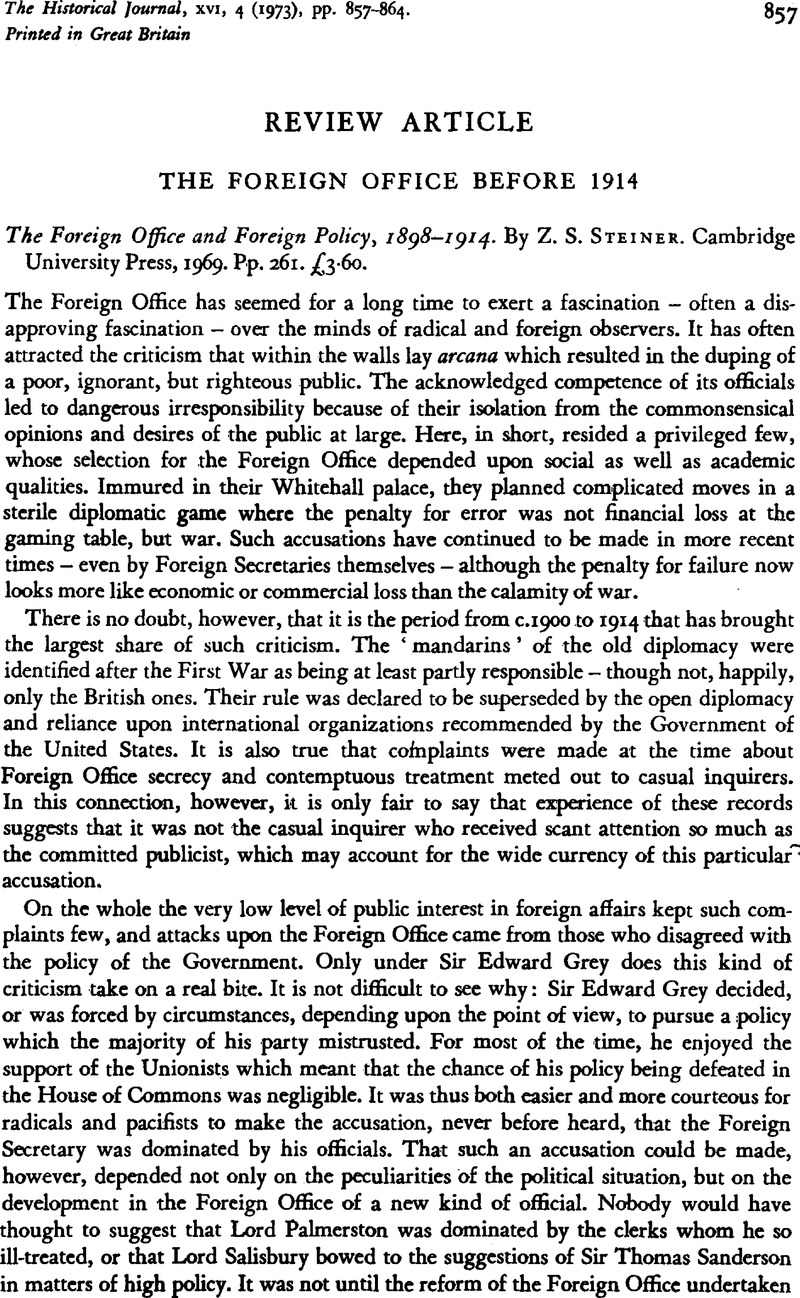Article contents
The Foreign Office before 1914
Published online by Cambridge University Press: 11 February 2009
Abstract

- Type
- Review Article
- Information
- Copyright
- Copyright © Cambridge University Press 1973
References
1 Jones, R., The Nineteenth Century Foreign Office (London, 1971), p. 112.Google Scholar
2 See, for example:
4 My dear Hardinge,
E Barrington came to see me today and in the course of conversation he asked me what the topics were on which the King wished to see Ld. Lansdowne tomorrow. I mentioned several of them and among others that of the Embassy at St Petersburgh. I then took advantage of the opportunity to tell him plainly that the King wished you to go there and he (B) admitted at once very “ nicely ” that you would be the best man for the Post, but added that as you had been so short a time at the F.O. it would create another bouleversement (as he called it) were you to leave it now. I asked him if you did not go whom he would suggest and he mentioned the names of Nicholson (sic) and Goschen, but not at all enthusiastically, admitting that the first had no “ presence ” and that the second would be hardly up to the Post.
However the King told me this evening … that he did not intend to give way about you, and he scorned the idea of Goschen.
I have told the King of my conversation with Barrington.
I asked the King this evening whether he did not think the St Petersburgh question ought to be settled as soon as possible, and he quite agreed.'
Knollys to Hardinge, 17 Dec. 1903, Hardinge Papers, vii, 3. Also Knollys to Bertie, 23 Dec. 1903, FO.800/176/P. 169.
3 In view of the widely held belief that Crowe was an early and important member of the reformers, and of Dr Steiner's statement that ' by 1904 … (he)… was becoming a crucial figure in the moulding of British policy towards Berlin … he was already marked for future promotion' (p. 66), it is as well to be clear about his movements.
In 1904, Crowe was still an assistant-clerk in the African Protectorates Department. Its work was about to be transferred to the Colonial Office, and Crowe was expected to go to the Parliamentary Department. Sanderson, however, wanted someone to help in the Consular Department but in the immediate future to administer the new Registry. As the reform had not yet passed the Treasury, Crowe was told in November or December 1904 that he was to prepare the final submission. From February 1905 Crowe refined the proposals to the Treasury and, coming late to the task, injected some real improvements, also providing Sanderson with some additional and powerful arguments with which to resist the reduction of 1st division staff.
When the new arrangements came into action, Crowe administered the Registry to such good effect that it required no further expert supervision after 15 Jan. 1906, when he was put into the Western Department. This was a vital moment for Crowe, since the relatively unimportant Consular Department would have awaited him, but for the unexpected breakdown of Hopwood. This accident, combined with his immense administrative efficiency, set him upon the path of major responsibility which he was to follow until 1914. His importance in the reforms, however, was in implementation rather than conception.
See: Librarian's Dept., Corres. and Memoranda, vol. 3a, pp. 139 and 166. Memorandum by Crowe, 5 Jan. 1905, Treasury 1/10369/4480, and the remainder of this immensely rewarding file. Minutes of Sanderson and Lansdowne, 18 and 20 Oct. 1905, FO.366/755. Sanderson to Murray, 5 Jan. 1906, FO.366/1136. Sanderson to Grey, 15 Jan. 1906, FO.366/761. Hardinge to Grey, 12 Feb. 1906, FO.366/761.
- 2
- Cited by


